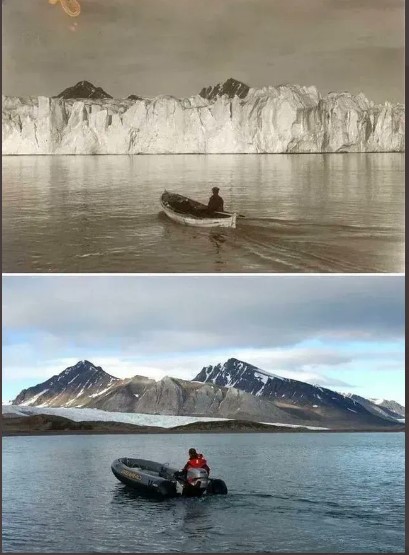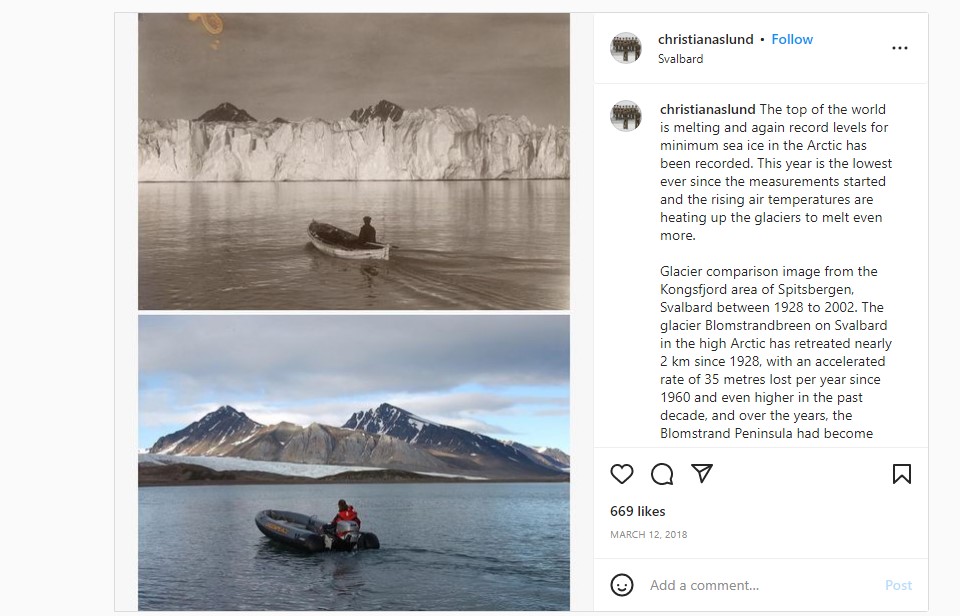A Twitter user shared a picture comparing significant changes in glaciers in the Arctic, claiming that the pictures were taken 100 years apart.
“2 photos of the Arctic taken 100 years apart showing the dramatic change in the continent’s ice cover. There is no time to waste. No planet B. #ActOnClimate,” the tweet reads.
2 photos of the artic taken 100 years apart showing the dramatic change in the continent ice cover.
There is no time to waste. No planet B. #ActOnClimate #ClimateEmergency #climate #energy #renewables #GreenNewDeal #cop27 pic.twitter.com/PCuHd9p05L
Advertisement— Mike Hudema (@MikeHudema) November 17, 2022
The post by @MikeHudema, a verified handle, as of the time of this report, has over 400 comments, 2,261 retweets and 4,003 likes.
Advertisement
Going by the bio on his Twitter account which has over 196,000 followers, Hudema is a climate campaigner who focuses on addressing climate crisis.
This is Arctic 105 years apart. Both picture taken in summer. Do you notice anything special. Courtesy Christian Åslund. pic.twitter.com/9AHtLDGKRb
— Parveen Kaswan (@ParveenKaswan) November 24, 2021
Advertisement
Another Twitter user, @ParveenKaswan, shared the same photo on his verified handle, claiming the pictures were taken 105 years apart. The post gathered over 3,247 retweets and 19.7k likes.
“This is Arctic 105 years apart. Both pictures taken in summer. Do you notice anything special? Courtesy Christian Åslund,” the account tweeted.
Like Hudema, Kaswan is also a climate campaigner, who has affiliations with the Indian forest service. His account has over 422.2k followers.
Advertisement
TheCable subjected both claims to a fact check and this is what we found.
Verification
Advertisement
The black-and-white image shows a person in a rowboat looking at a glacier-covered mountain. At the bottom of the first picture, is a coloured image showing a person in a motorized-looking boat, gazing at a similar mountain.

Advertisement
As seen in the photos, the glaciers in the black and white picture were of a sizeable stature but appeared to have melted away in the second frame, which was taken more recently, compared to the former.
An extensive keyword search and reverse image search by TheCable revealed that Christian Åslund, a photographer, took the coloured images during the summer season of 2002, in a project collaboration with Greenpeace.
Advertisement
The project is aimed at engaging photographers to recreate environmental images.
In this case, the photographer was showing the impact of climate change by comparing how the Arctic glacier has changed over time.
According to academic research published in August 2022 by Nature.com, evidence shows that in recent decades, the warming in the Arctic has been much faster than in the rest of the world, a phenomenon scientifically known as Arctic amplification.
The report also acknowledged that numerous studies have reported that the “Arctic is warming either twice, more than twice, or even three times as fast as the globe on average”.
However, according to Christian Åslund, the photographer who took the second frame, both pictures were not taken a century apart.

Sharing the pictures in an Instagram post, Aslund said the black and white picture was taken by the Norwegian Polan Institute in 1928, while she recreated the coloured frame in 2002.
“Glacier comparison image from the Kongsfjord area of Spitsbergen, Svalbard between 1928 to 2002.
“The glacier Blomstrandbreen on Svalbard in the high Arctic has retreated nearly 2 km since 1928, with an accelerated rate of 35 metres lost per year since 1960 and even higher in the past decade, and over the years, the Blomstrand Peninsula had become Blomstrand Island,” the photographer wrote on Instagram.
“Both of the images were taken during the summer season.
“B/w image courtesy of Norwegian Polar Institute, the year 1928. Colour image Christian Aslund/Greenpeace, year 2002.”
According to the Instagram caption, the difference between both pictures is 74 years, not 100 years or 105 years as the climate advocates alleged.
Verdict
Both pictures are real and they both show the difference in the state of the Arctic, but they don’t show a 100-year or 105 years comparison.
The original photo was taken in 1928 from Svalbard, between Norway and the north pole. The more recent photo was taken in 2002 by a Swedish photographer.
This fact check was produced by TheCable with support from Code for Africa’s PesaCheck, International Fact-Checking Network, and African Fact Checking Alliance network.
Add a comment







